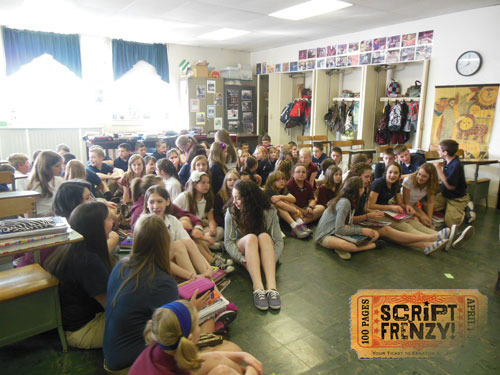The Young Writers Program: Writing Geeks, Sci-Fi Plays, and Hunting Your Word Count

This past April, Camp NaNoWriMo allowed participants to choose both their word count and their preferred writing form, whether that was a script, short story, novel, poem, or even the back of a cereal box.
Educator Cynthia Garcia took the opportunity to keep alive the spirit of Script Frenzy, a retired program that challenged people to write 100 pages of a script in 30 days. Cynthia hosts two NaNoWriMo events every year at Fairmont Catholic School as an extracurricular activity for students. Since 2010, the participants have grown from twenty to 83.
“NaNoWriMo and Script Frenzy have been the most dazzlingly successful of our projects,” said Cynthia. “Students are engaged with the writing, they are engaged with the project, and they are engaged with each other. They even share their writing with their parents and friends outside school, which I think is terrific, as it makes it that much more meaningful to them.”
As a middle school teacher of English, religion, and art, Cynthia has witnessed the afterschool program expand from “writing geeks” to include every type of student, including academic underachievers.
“These programs are for everybody, and they are especially great for kids who are creative but don’t have a good outlet for their creativity in their daily classroom activities. I have many students who really struggle to produce 300 words for a classroom writing assignment and yet can pound out pages of a novel or a play and think nothing of it.”
She has found that NaNoWriMo’s combination of disciplined daily writing, goal-setting, and “upbeat, fun, kid-friendly tone” keeps students engaged, no matter their initial level of interest in writing.
“I’ve been especially delighted to see how NaNo and Script Frenzy have caught on with the boys,” she said. “Middle school boys are notoriously not big fans of language arts, but we routinely have boys participating at all grade levels. Last year I had a great group of popular, athletic eighth grade boys who wrote a science fiction play and performed it during our Frenzy Festival.”
NaNoWriMo also creates community and friendly competition among students who connect over plot twists, word counts, and character development.
“I love all the great motivators that the programs offer—the progress chart, pencils, stickers, web info, online word count tracking, t-shirts, parties, ideas from other teachers—they help us to celebrate writing and make it accessible to our whole school community.”
Many students even take NaNoWriMo outside of the classroom.
“The first year I did NaNo, one of my sixth graders told me that since hunting season opened in November, he had been forced to take a notebook to his hunting camp and write by hand, so that he wouldn’t fall behind on his word count.”
For many students, NaNoWriMo’s programs are more than a headlong dive into a creative writing adventure. They provide a safe space for students to learn and explore the drama in their own lives.
Cynthia says, “I’ve had students use their writing to process and come to terms with diverse issues: moving, illness, death in the family, peer tensions, sibling problems—practically everything shows up in their fiction. Middle schoolers live ‘drama’ every day, but when they write drama, it gives them a chance to look at it with some perspective, some sense of order and control.”
Are you keeping the Frenzy alive? Tell us about it!
— Andrea
Chris Baty's Blog
- Chris Baty's profile
- 63 followers



